新概念英语第一册 131-132课课件
合集下载
新概念英语一(131-132)课(课堂PPT)
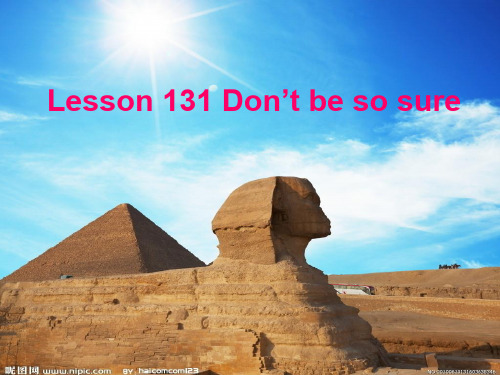
( )5. Do you think they are butchers? I’m not sure. They _____ be bakers. A must B、may C、have to
( ) 6. Don’t be so sure . We might not go ______.
A everywhere B、anywhere C、left
9
(1) T: Do you think he's in his room?
S: I'm not sure. He may be in his
room.
(2) T: Do you think they were
reading?
S: I'm not sure. They may have
been ree /can’t be/ may be 情态动词表推测辨析
通过L129-L130与L131-L132课文内容,找出 含有must be\can’t be\may be 的句子,然后 进行如下总结 must be :通常用于________推测,语气较强 “_______” can’t be : 通常用于_______推测 “_______” may be :语气较弱 表“________”
22
23
小组版面展示书后习题
24
25
travel? S: He thinks they may travel by sea. 7
Lesson 132 He may be… He may have been… I’m not sure.
8
Task one: Listen the examples and elicit 通过听例句尽可能总结出你所获得的信 息内容
新概念英语第一册131-132课课件PPT
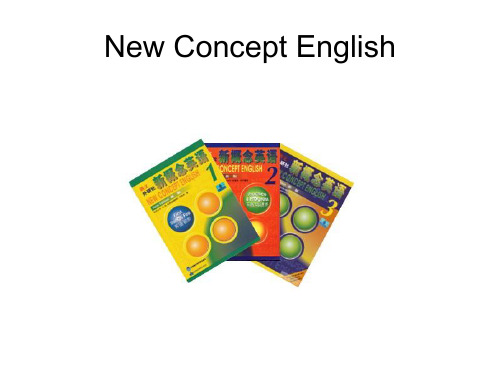
• GARY: Don't be so sure. • We might not go anywhere. • My wife always worries too much. • Who's going to look after the dog? • Who's going to look after the house? • Who's going to look after the garden?
•
We have this problem every year. • In the end, we stay at home and look after everything! • at first 开始 • look after=take care of
Review
• 对现在的肯定推测:must
be一定…
may/might be 可能… can’t be 对现在的否定推测 may/might not be
对过去的推测 must /can’t have been
make a decision
• MARTIN: Will you travel by sea or by air? • by sea=by ship/by air=by plane • GARY: We may travel by sea. • MARTIN: It's cheaper, isn't it? • GARY: It may be cheaper, but it takes a long time.
New Concept English
Hale Waihona Puke AliceNew words and expressions • Egypt ['i:dʒipt] n. 埃及 • abroad [ə'brɔ:d] adv. 国外 • worry ['wʌri] v. 担忧
新概念英语NCE1_lesson131-132(共51页)课件

When are you coming back? , it depends.
It depends on whether they win or not.
② v. 依靠;依赖 The country depends heavily on its export of farming products.
Lesson 131 Don't be so sure!
worry ① v. 担忧;发愁
worry about worry too much
She’s worried that she might lose her job soon.
② v. 困扰;使不安宁 She is always worrying him for presents.
③ v. 引领;(初次)提出 He introduced a new topic for our discussion.
really ① adv. 真正地;确实地
He wants to know what really happened.
② adv. (用以加强语气)实在;其实 You don’t really expect him to believe that.
③ v. (口)非常好;给人深刻印象的 She looks sensational in that dress!
wonder ① v. 感到好奇;想要知道
I wonder why he hasn’t come.
② v. 感到惊讶(或诧异) I shouldn’t wonder if she is elected.
Just let me try!
Her parents wouldn’t let her go out with that boy.
It depends on whether they win or not.
② v. 依靠;依赖 The country depends heavily on its export of farming products.
Lesson 131 Don't be so sure!
worry ① v. 担忧;发愁
worry about worry too much
She’s worried that she might lose her job soon.
② v. 困扰;使不安宁 She is always worrying him for presents.
③ v. 引领;(初次)提出 He introduced a new topic for our discussion.
really ① adv. 真正地;确实地
He wants to know what really happened.
② adv. (用以加强语气)实在;其实 You don’t really expect him to believe that.
③ v. (口)非常好;给人深刻印象的 She looks sensational in that dress!
wonder ① v. 感到好奇;想要知道
I wonder why he hasn’t come.
② v. 感到惊讶(或诧异) I shouldn’t wonder if she is elected.
Just let me try!
Her parents wouldn’t let her go out with that boy.
新概念第一册Lesson131-132(28张PPT)
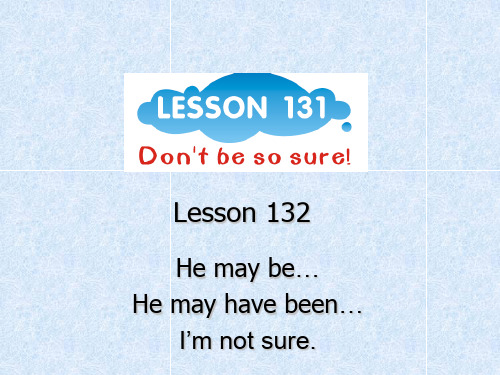
Notes on the text 课文注释 1 We may go abroad. 我们可能去国外。 在英文中用may来表示可能发生的事情,在may后面加动词原形。 请注意may表示的是一种可能性,这与第127课所讲的表示有根据 的推论是有区别的。
2 make up our minds, 打定主意。 3 Don't be so sure. 别那么肯定。 在祈使句中,be动词的否认形式要用don't be,这种结构常常用于 劝告。
GARY:We may go abroad. I'm not sure. My wUifneiwt 6a6nts to go to Egypt. I'd like to go there, too. We can't make up our minds.
1、情态助动词may表示可能性“可能,也许,或许“ may和might都表示“可能、也许〞,might所表示的可能性要比 may小,且当情况是虚拟时只能用might而不能用may。 may表示现在或将来的可能性:may+动词原形
相当于decide,常跟to do sth. 表示决心或决定 去做某事。
Unit 66
MARTIN:Will you travel by sea or by air? 1、选择疑问句,要求答话人在两个或多个人或事物中作出选择,不能用yes或no 作答复. Would you like some bananas or apples? 你想吃香蕉还是苹果? MARTIN:It's cheaper, isn't it? It's cheaper. = It`s cheaper to travel by sea than by air. isn't it? 与前面的陈述句一起构成反意疑问句。结构为:陈述句+反意的简略式疑问句。 反意疑问句要用yes或no来答复,肯定与否根据事实来确定,不受问句中肯定与 否认的影响。 —You are a student , aren`t you? 你是学生,不是吗?—Yes ,I am. 是的,我是 。 —No, I`m not. I am a teacher. 不,我不是,我是一位老师。
新概念英语第一册 Lesson131-132 (共25张PPT)

Language Structure
(6) I’m sure you’ll enjoy yourselves. enjoy yourselves = have a good time 玩得愉快
Language Structure
(7) Who’s going to look after the dog/ the house/the garden?
Language Structure
(4) We can’t make up our minds. make up one’s mind意为“下决心,打定主意”, 相当于动词decide; make up one’s mind to do sth. 意为“决定做某事” 注意:mind是可数名词,它的数随one’s来确定。 如本课中our minds
Language Structure
(2) We may go abroad. 情态动词may与might的用法 (详见重点语法)
Language Structure
(3) I’d like to go there, too. ’d like是would like的缩写形式 would like to do = want to do 想要做某事 e.g. I’d like to travel abroad. 我想要出国旅行。
常用短语:in the end = at last = finally 最后
Game on!
Make up a story 故事接龙 Instructions: One student says a sentence with new language structure. The next one says a different sentence with different language structure, but base on the previous student. Such as this, one by one, to make a story. Afterwards, read a full story that the students have created.
新概念英语第一册第131-132课课件
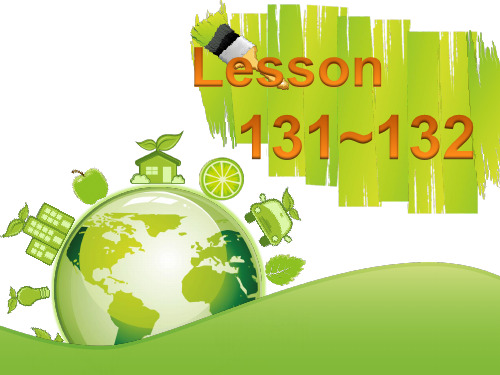
worry /'wʌrɪ/ 1) v. 担忧;发愁 妈妈一定非常担心他们俩。 担心,担忧某人 worry about sb. Mom must worry about them.
拓展: 担心的,担忧的 adj. worried
担心,担忧某人
be worried about
Mom must be worried about them.
拓展:
Egyptian
/ɪ'dʒɪpʃn /
他是埃及人。
n. 埃及人
He is Egyptian.
abroad /ə'brɔːd/ adv. (在)国外,(到)国外 他想去国外。 出国 go abroad He wants to go abroad.
习主席在国内外都很有名。 国内外 home and abroad President Xi is famous at home and abroad.
Martin:It's cheaper, isn't it? Gary:It may be cheaper, but it takes a long time. Martin:I'm sure you will enjoy yourselves.
Gary: Don't be so sure.We may not go anywhere. My wife always worries too much. Who's going to look after the dog?
may 情态动词表猜测 1. 对过去状态的推测(不确定) may have been...
may have been
过去可能
她可能已经10岁了,我不确定。
新概念英语第一册131-132课PPT课件

第9页/共24页
• worry • ① v. 担忧;发愁 • What’s worrying you? • 犯什么愁呢? • 妈妈总是过度忧虑,而这使她疲惫。 • Mum always worries too much and it makes her tired. • worry about 担心 • 别担心那件事 • Don't worry about it. • ② v. 困扰;使不安宁 • She is always worrying him for presents. • 她总是缠着他要礼物。
第15页/共24页
• My wife wants to go to Egypt. I’d like to go there, too. We can’t make up our minds.
• would like to do sth 愿uld you like to have a look at your room? • would like sth 想吃(喝,得到)某物 • 想来杯茶吗? • Would you like a cup of tea? • make up one’s mind 下决心,决定 • 我还没打定主意。 • I haven’t make up my mind yet.
第16页/共24页
• Will you travel by sea or by air? • 选择疑问句要求答话人在两个或更多人或事物中做出选择,
不能用yes 或no 作回答。 • 你想吃香蕉还是苹果? • Would you like some bananas or apples? • 我想来个苹果 • I’d like an apple. • 你是医生,老师还是科学家? • Are you a doctor, a teacher or a scientist? • 都不是,我是学生。 • None of them. I am a student.
• worry • ① v. 担忧;发愁 • What’s worrying you? • 犯什么愁呢? • 妈妈总是过度忧虑,而这使她疲惫。 • Mum always worries too much and it makes her tired. • worry about 担心 • 别担心那件事 • Don't worry about it. • ② v. 困扰;使不安宁 • She is always worrying him for presents. • 她总是缠着他要礼物。
第15页/共24页
• My wife wants to go to Egypt. I’d like to go there, too. We can’t make up our minds.
• would like to do sth 愿uld you like to have a look at your room? • would like sth 想吃(喝,得到)某物 • 想来杯茶吗? • Would you like a cup of tea? • make up one’s mind 下决心,决定 • 我还没打定主意。 • I haven’t make up my mind yet.
第16页/共24页
• Will you travel by sea or by air? • 选择疑问句要求答话人在两个或更多人或事物中做出选择,
不能用yes 或no 作回答。 • 你想吃香蕉还是苹果? • Would you like some bananas or apples? • 我想来个苹果 • I’d like an apple. • 你是医生,老师还是科学家? • Are you a doctor, a teacher or a scientist? • 都不是,我是学生。 • None of them. I am a student.
新概念一册Lesson131-132课件

eg: He is sure of success. 他确信他会成功。
We are sure that he is innocent. 我们确信他是无辜的
Be sure to call me at 5 o`clock. 五点务必打电话给我
make sure 确信 证实 to be sure 肯定,的确,固然 ,后面多接but
somewhere 某地,用于肯定句 nowhere 没有任何地方
My wife always worries too much. ……In the end, we stay at home and look after everything!
(1)problem 存在的需要解决的问题 question 疑问,需要回答的问题
B. may也可表示过去的可能性:may have (done) He was late. He may have been busy. 他迟到了,大概是太忙了。
2. be sure 肯定 be sure of / about +n. 对……有把握 be sure that 肯定,确信 be sure to do 肯定,一定,务必
May I come in? No, you mustn’t. 3) may /might 推测性用法 可能 He may be right.
注意: 1. 只用于肯定和否定句中,不用于疑问句中。 2. might 比may可能性更小 may no 可能不 can not不可 3.表建议(可和as well 连用) You may(might)as well stay where you are. 还是……的好 4.表祝愿
may也可表示过去的可能性: may have (done)
We are sure that he is innocent. 我们确信他是无辜的
Be sure to call me at 5 o`clock. 五点务必打电话给我
make sure 确信 证实 to be sure 肯定,的确,固然 ,后面多接but
somewhere 某地,用于肯定句 nowhere 没有任何地方
My wife always worries too much. ……In the end, we stay at home and look after everything!
(1)problem 存在的需要解决的问题 question 疑问,需要回答的问题
B. may也可表示过去的可能性:may have (done) He was late. He may have been busy. 他迟到了,大概是太忙了。
2. be sure 肯定 be sure of / about +n. 对……有把握 be sure that 肯定,确信 be sure to do 肯定,一定,务必
May I come in? No, you mustn’t. 3) may /might 推测性用法 可能 He may be right.
注意: 1. 只用于肯定和否定句中,不用于疑问句中。 2. might 比may可能性更小 may no 可能不 can not不可 3.表建议(可和as well 连用) You may(might)as well stay where you are. 还是……的好 4.表祝愿
may也可表示过去的可能性: may have (done)
新概念英语第一册第131-132课课件

• My wife wants to go to Egypt. I’d like to go there, too. We can’t make up our minds. • would like to do sth 愿意做某事,想做某事 • 你想看看你的房间吗? • Would you like to have a look at your room? • would like sth 想吃(喝,得到)某物 • 想来杯茶吗? • Would you like a cup of tea? • make up one’s mind 下决心,决定 • 我还没打定主意。 • I haven’t make up my mind yet.
课文讲解
• Where are you going to spend your holidays this year, Gary? • spend v. 花费时间,金钱,度过时光,假日等 • spend….on sth • spend ….(in) doing sth • 她把大量的钱花在(买)衣服上。 • She spends a lost of money on clothes. • 我每天花1小时做体育运动。 • I spend one hour on sport every day.
• • • • • • •
Don’t be so sure. We might not go anywhere. might 表示非常不确定 anywhere 任何地方,副词作状语 somewhere某地,用于肯定句 nowhere 没有任何地方 我想去转转,但是因为下雨了,我哪也没去。 I wanted to go somewhere, but because of the rain, I went nowhere.
新概念英语NCE1_lesson131-132(共17页)课件

• abroad [əˈbrɔ:d] adv.国外 ←→home
go abroad 出国 live abroad 在国外生活 at home and abroad
在国内外
• worry [ˈwʌri] v.担忧 worries--worried--worried
worry about sb./sth. 担心某人或某事 eg:My wife always worries our children.
adj.worried 烦恼的,忧虑的 worrying 使人烦恼的
• interesting interested • surprising surprised • exciting excited
• 现在分词、过去分词做adj. 主语不一样,现在分词主语为
物,过去分词主语为人
数阅
学读
使使
人人
2)may/might表推测,只是一种 可能,并不确定
might比may的语气更弱,更委婉
may not可能不 can't不可能
• 表推测的情态动词的用法:
can不肯,may不问,must肯定 不否问
即:can不用于肯定句,may不 用于疑问句,用于肯定句可以 表示不肯定的推测,must只用 于肯定句,表示肯定的推测
自己允许别人做 eg:You may leave now.
• 2、表推测“可能…”
may/might+be/do→对现在或一般 情况的推测
may/might+be doing→对现在或将 来正在进行的事情的推测
may/might+have done→对过去情 况的推测
may/might+have been doing→对 过去正在进行的事情的推测
新概念一Lesson131-132课件(共39张PPT)
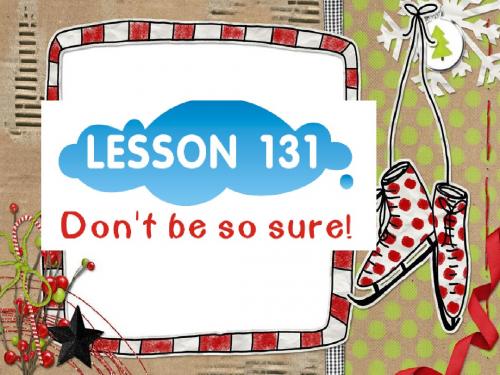
• would like to do sth 愿意做某事,想做某事
• = want to do sth. • 你想看看你的房间吗?
• Would you like to have a look at your room? • would like sth 想吃(喝,得到)某物 • 想来杯茶吗? Would you like a cup of tea? • 注意:feel like sth. /doing sth.想要某物;想做某事 • I feel like a drink.我想喝一杯。 • We all feel like celebrating.我们都想庆祝一番。
• spend….on sth.(跟名词) • spend ….(in) doing(跟动词) sth. • 她把大量的钱花在(买)衣服上。
• She spends a lost of money on clothes. • 我每天花1小时做体育运动。
• I spend one hour in doing sports every day.
• They just returned from abroad.
• Phrases: home and abroad 国内外
•
go abroad 出国
•
study abroad 海外留学
•
travel abroad 到国外旅行
•
worry
• ① v. 担忧;发愁
• worry+直接宾语
• What’s worrying you?犯什么愁呢?
• I wanted to go somewhere, but because of the rain, I went nowhere.
• My wife always worries too much.
• = want to do sth. • 你想看看你的房间吗?
• Would you like to have a look at your room? • would like sth 想吃(喝,得到)某物 • 想来杯茶吗? Would you like a cup of tea? • 注意:feel like sth. /doing sth.想要某物;想做某事 • I feel like a drink.我想喝一杯。 • We all feel like celebrating.我们都想庆祝一番。
• spend….on sth.(跟名词) • spend ….(in) doing(跟动词) sth. • 她把大量的钱花在(买)衣服上。
• She spends a lost of money on clothes. • 我每天花1小时做体育运动。
• I spend one hour in doing sports every day.
• They just returned from abroad.
• Phrases: home and abroad 国内外
•
go abroad 出国
•
study abroad 海外留学
•
travel abroad 到国外旅行
•
worry
• ① v. 担忧;发愁
• worry+直接宾语
• What’s worrying you?犯什么愁呢?
• I wanted to go somewhere, but because of the rain, I went nowhere.
• My wife always worries too much.
- 1、下载文档前请自行甄别文档内容的完整性,平台不提供额外的编辑、内容补充、找答案等附加服务。
- 2、"仅部分预览"的文档,不可在线预览部分如存在完整性等问题,可反馈申请退款(可完整预览的文档不适用该条件!)。
- 3、如文档侵犯您的权益,请联系客服反馈,我们会尽快为您处理(人工客服工作时间:9:00-18:30)。
A.costB.tookC.spent
3.It _A_/_B_ me an hour to write the letter.
A.costB.tookC.spent
• I’m sure you’ll enjoy yourselves.
• Don’t be so sure. We might not go anywhere.
My wife wants to go to Egypt. I’d like to go there, too. We can’t make up our minds.
would like to do sth 愿意 做某事,想做某事
would like sth 想要某物 make up one’s mind 下决 心,决定
spend—spent—spent
spend….on sth 花费(时间/金钱)在……上 spend ….(in) doing sth 花费(时间/金钱)做某事
Eg.她把大量的钱花在(买)衣服上。 She spends a lot of money on clothes. eg.我每天花1小时做体育运动。 I spend one hour (in )doing sports every day.
spend
take
cost
主语
只能是人
事,物或形式 主语it
事,物,人或 形式主语it。
宾语
时间或金钱 通常是钱
通常是时间
1.The computer_B_/_C me $2 000.
A.spendsB.costsC.takes
2.I _C__ all day looking for you yesterday.
当“度过“讲时句型结构为:
spend + n.(时光,假日)+地点 Eg.我打算到悉尼度假。 I am going to spend my holidays in
Sydney. Eg.我在一个小城镇度过了我的周末。 I spent my weekend in a small town.
may 情态动词“可能,也许,或许” 情态动词后接 动词原形 Eg:明天也许会下雪。 It may snow tomorrow. 如果我忙的话,也许就不去了。
If I’m busy, I may not go.
情态动词变否定: 直接在单词后加 “not”
sure 肯定,当然 sure (口语)“当然可以“ 相当于certainly 我能开窗吗?当然! May I open the window? Sure! make sure +句子 确定…… 请确定门是开着的。 Please make sure that the door is open.
look after =take care of 照看,看管
In the end, we stay at home and look after
everything! in the end 最后,到头来,说明结果 finally 最后,说明次序 at last 最后,终于(说明目的的实现)
总结
• 去国外;国内外? • 担心短语? • spend用法? • 情态动词后接?;如何变否定形式 • sure用法? • 下决心短语? • it做主语,花费某人时间做某事短语? • 玩得愉快短语? • 照看短语? • 最后短语?
单词复习
abroad
wo abroad
home and abroad
课文讲解
• Where are you going to spend your holidays this year, Gary?
We may go abroad. I’m not sure.
spend v. 花费时间,金钱
=decide/make a decision
请下定决心。 Please make up your mind .
Will you travel by sea or by air?
We may travel by sea. It’s cheaper, isn’t it?
It may be cheaper, but it takes a long time.
Don't be so sure!
words
l Egypt ['i:dʒɪpt]n. 埃及 l abroad [ə'brɔ:d]adv. 国外 • go abroad 去国外 • home and abroad 国内外 l worry ['wʌri] v. 担忧
worry about 担心
Egypt
Homework
• 单词五遍并背诵。 • 课文默写三遍并背诵。 • 复习笔记重点短语和语法,下节课提问 • 并小考。
1. Tom was watching TV.He_____(must wash) the dishes. 2. Do you have anything_____(tell) me? 3. She had a bad cold,_____ _____? 4. Will you go to Egypt_____(sea)? 5. It takes her one hour ______(have) breakfast every morning. 翻译: 7.我学习英语是为了出国。 8.我认为Lily今晚不想睡觉。
•
• enjoy oneself=have a good time 玩得愉快
• might 表示非常不确定,情态动词 接动词原
形
• My wife always worries too much. Who's going to look after the dog? Who's going to look after the house? Who's going to look after the garden? We have this problem every year.
选择疑问句不能用yes 或no 作回答, 要视具体情况回答。
反义疑问句句式特点: 前肯后否,前否后肯,前be后be,前无be后加助,时态 一致,人称一致。
take 花费,占用 It takes sb 时间/金钱 to do sth 做某事 占用了某人…时间做某事
spend,cost,take区别
